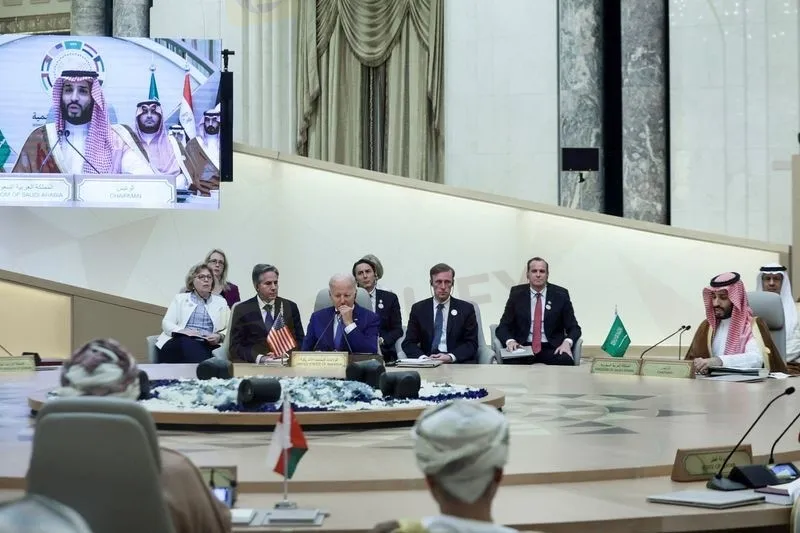OPEC+ oil output cut shows widening rift between Biden and Saudi royals
Zusammenfassung:As a results of The OPEC+ organization’s decision, cut oil production will be cut despite stiff U.S. opposition has further strained already tense relations between President Joe Biden’s White House and Saudi Arabia’s royal family, once one of Washington’s staunchest Middle East allies, according to interviews with about a dozen government officials and experts in Washington and the Gulf.

As a results of The OPEC+ organization‘s decision, cut oil production will be cut despite stiff U.S. opposition has further strained already tense relations between President Joe Biden’s White House and Saudi Arabia‘s royal family, once one of Washington’s staunchest Middle East allies, according to interviews with about a dozen government officials and experts in Washington and the Gulf.
The White House pushed hard to prevent the OPEC output cut, these sources said. Biden hopes to keep U.S. gasoline prices from spiking again ahead of midterm elections in which his Democratic party is struggling to maintain control of the U.S. Congress. Washington also wants to limit Russias energy revenue during the Ukraine war.
The U.S. administration lobbied OPEC+ for weeks. In recent days, senior U.S. officials from energy, foreign policy and economic teams urged their foreign counterparts to vote against an output cut, according to two sources familiar with the discussions.
Amos Hochstein, Biden‘s top energy envoy, along with national security official Brett McGurk and the administration’s special envoy to Yemen Tim Lenderking, traveled to Saudi Arabia last month to discuss energy issues, including the OPEC+ decision. They failed to prevent an output cut, just as Biden did after his own July visit.
US officials “tried to position it as us versus Russia,'” said one source briefed on the discussions, telling Saudi officials they needed to make a choice.
That argument failed, the source said, adding that the Saudis said that if the United States wanted more oil on the markets, it should start producing more of its own.
The United States is the worlds No. 1 oil producer and also its top consumer, according to data from the U.S. Energy Information Administration.
The Saudi government media office CIC did not respond to Reuters emailed requests for comment about the discussions.
“We are concerned first and foremost with the interests of the Kingdom of Saudi Arabia and then the interests of the countries that trusted us and are members of OPEC and the OPEC + alliance,” Energy Minister Prince Abdulaziz told Saudi TV Wednesday.
OPEC weighs its interests with “those of the world because we have an interest in supporting the growth of the global economy and providing energy supplies in the best way,” he said.
Washington‘s handling of the Iran nuclear deal and withdrawal of support for a Saudi-led coalition’s offensive military operations in Yemen have upset Saudi officials, as have actions against Russia after the February 2022 invasion of Ukraine.
WikiFX-Broker
Aktuelle Nachrichten
Ozempic bald 80 Prozent günstiger? Hikma Pharmaceuticals will von auslaufenden Patenten profitieren
Bericht über Megaprojekt in Saudi-Arabien: Neom-Manager sollen Finanzberichte manipulieren, um hohe Kosten zu vertuschen
„Viel zu hohe Risiken – Branchenverband für Volksbanken fordert strengere Regeln für die eigenen Banken
Ford Deutschland in den roten Zahlen – jetzt soll eine Milliarden-Finanzspritze des US-Konzerns helfen
Corona-Überflieger Biontech machte einst Milliardengewinne – mittlerweile aber Verluste und kündigt Stellenabbau an
Ich bin 38 und CEO von Trivago: Diese 6 Skills machen euch zu einer guten Führungskraft
Webasto: Angeschlagener Automobilzulieferer braucht 200-Millionen-Finanzspritze
Trotz sinkendem Absatz: VW-Tochter Traton steigert Rendite und erhöht die Dividenden für Anleger
CO₂-Ziele aufgeschoben: So soll die Autoindustrie gerettet werden
VW-Mitarbeiter erhalten Prämie noch einmal ungekürzt
Wechselkursberechnung


